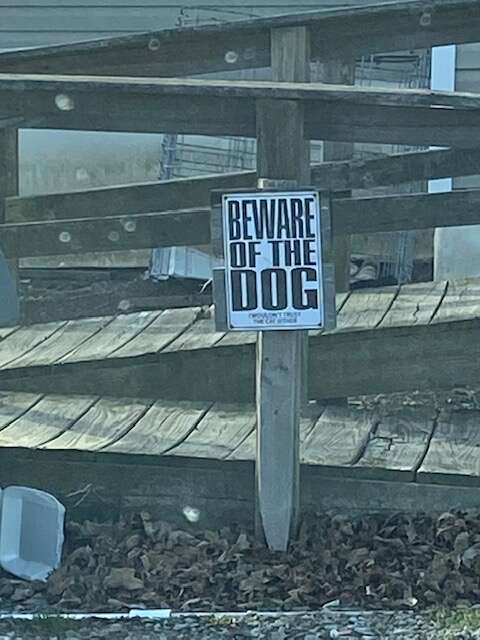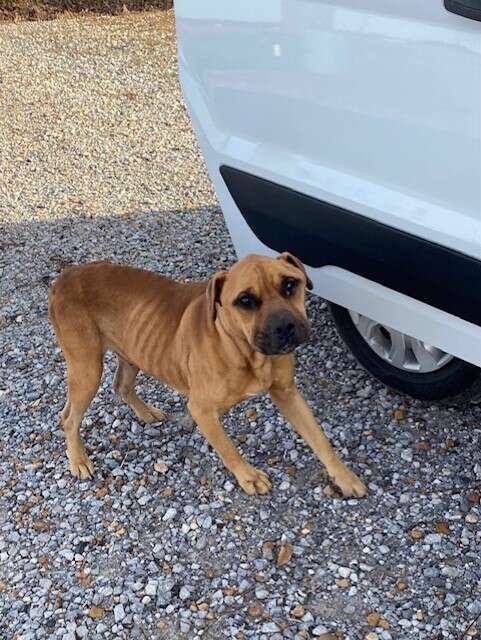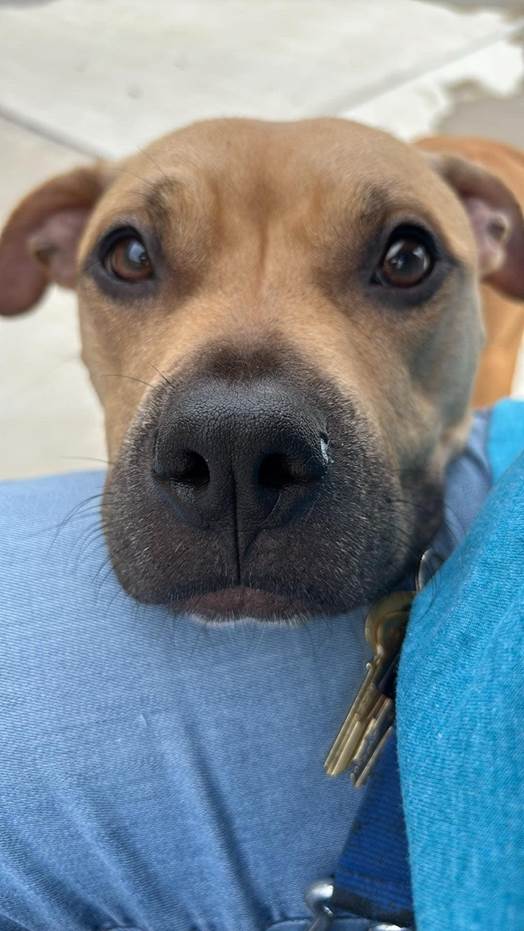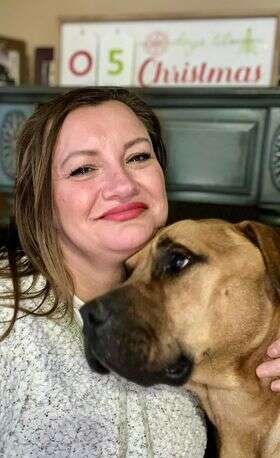Riven was not a name given to him by his original human; it was a name earned by the jagged, internal split that occurred one Tuesday afternoon. He was a magnificent German Shepherd mix, a tapestry of tan and black fur, with eyes the color of dark honey—eyes that held too much intelligence and far too much loyalty for his own good.
The house, once a warm, boisterous place, had been sealed like a tomb. Riven remembered the green pickup truck, the boxes, the hurried movements of his human, David, who knelt before the front door, whispering promises of return. “Be a good boy, Riven. Guard the house. I’ll be back for you.”
But David never returned.
The memory of the promise, however, had an anchor: the spare brass key. As David had fumbled with the deadbolt, the key had slipped from his grasp, landing with a faint metallic chime on the cracked concrete step, half-hidden beneath a tangle of Bermuda grass. David, distracted and distraught, hadn’t noticed. Riven had.

In the simple, unwavering logic of a dog, the key became the Command. He could not leave because the house was locked, and his job was to wait until that key—or another like it—was turned. The key was the physical embodiment of the promise.
Eight years passed in a monotonous cycle of sun, snow, and rain. The paint on the porch peeled back like sunburnt skin. The roof developed a dark green patina of algae. The overgrown rose bushes, which Riven was once scolded for digging, grew into thorny, impassable barricades. The only thing that did not decay was Riven’s resolve.
His territory shrunk to the small, dusty patch beneath the warped oak tree near the gate. This provided the barest shelter from the elements. He ate sparingly, relying on the quiet charity of two elderly neighbors—Mrs. Henderson and Mr. Dale—who left dry kibble and water near the rusted mailbox once a day. They respected his vigil; they knew better than to approach the large, silent dog who looked at them without accusation, only profound focus.
They called him “The Sentinel.” Riven was lean, scarred, and perpetually dusted with the fine grit of the unkempt yard, but the intensity in his amber eyes was undimmed. He was a living statue carved from commitment.
He rarely slept deeply. Every sound was a truck engine. Every shadow was David’s silhouette. He was constantly listening for the tell-tale sound of the key rattling the lock, a sound that would mean the split in his world was finally healed. His life was the definition of his name: Riven, torn apart, patiently holding the fragments together by sheer will.
The arrival of Calla was not a dramatic event, but a slow, geological change.
Calla worked for a local animal welfare group, and Riven’s plight was a frustrating, heartbreaking file on her desk. The neighbors had tried. Animal Control had tried. But Riven was clever and agile, disappearing into the undergrowth the moment he sensed confinement or aggression. His loyalty had made him wild.

Calla understood that Riven wasn’t aggressive; he was occupied. His attention was consumed by a duty that overshadowed every biological need. She decided against tactics of force or surprise. She chose patience.
Her first visit, on a cool Tuesday morning—the eighth anniversary of David’s departure, though she didn’t know it—was simple. She parked her modest sedan a block away and walked toward the house. She wore soft colors, moved slowly, and carried nothing but a book and a thermos. Riven watched her from beneath the oak, his body tense but his eyes merely observing.
Calla stopped at the curb, a good fifty feet from him, and sat on the low retaining wall. She opened her book and began to read aloud, her voice low and melodic, reading passages from an obscure collection of nature poems. She didn’t look at Riven. She didn’t call his name. She simply existed in his space, a calm, predictable part of the environment, like the wind or the slow drift of clouds.
For two weeks, she repeated this routine. Forty-five minutes every morning. The distance remained the same. On the third week, she moved ten feet closer. Riven stiffened, but held his place.

On the fourth week, she brought a clean, faded blue blanket. She placed it halfway between her sitting spot and the gate, then retreated. Riven didn’t approach it. He didn’t need comfort; he needed closure.
Calla shifted her strategy. She began to speak directly to him, still in that low, musical register. “You’re a handsome boy, Riven. I see you. I see how hard you’ve worked.” She spoke of commitment, not abandonment, validating the only thing he had left.
The breakthrough came on a cold, drizzly evening when Calla had almost given up for the day. She had left a bowl of warm broth near the blanket, along with a small, smooth river stone she’d picked up. As she turned to walk away, she spoke softly, her voice barely audible over the rain.
“You’ve carried the key for long enough, Riven. It’s time for someone else to hold the weight.”
That phrase, carried the key, pierced the eight-year-old fog. Riven rose. His joints cracked and protested. He looked past Calla, past the gate, all the way to the faded porch steps where the brass key lay half-buried. He took a single, agonizing step toward the porch, then paused, his massive head drooping. The reality of the empty house, the years of fruitless waiting, finally overwhelmed the command.

He turned his head slowly, tracking Calla. For the first time, his gaze was not fixed on duty, but on her—on the open, gentle compassion in her face. Then, the inevitable happened. Not a bark of anger, or a whimper of fear, but a visible, profound release of sorrow. A dark, glistening track of moisture ran from his amber eye, tracing a path down his dust-caked face. It was the only soundless cry of grief Calla had ever witnessed. He lowered his head, walking slowly, not to the food, but to Calla’s feet, and collapsed in exhaustion, finally resting the enormous weight of his loyalty.
The moment Riven allowed the gentle touch, the practicalities of rescue began. Calla didn’t use a slip lead; she used a soft leather collar, slipped over his head while he was still nestled at her feet.
The drive to the veterinary clinic was a terrifying blur for Riven. The small, enclosed space of the car was too reminiscent of the green truck that had driven away. He trembled so violently Calla could feel the vibrations through the seat.
The clinic was a shock of bright lights and sharp smells. Dr. Lena diagnosed him quickly: severe malnutrition, chronic dehydration, dental rot, and a deep-seated post-traumatic stress disorder (PTSD). “He’s physically depleted, Calla,” Dr. Lena said, looking at the large, shivering dog on the examination table. “But his heart is what’s truly exhausted.”

Riven spent a week at Calla’s small apartment in the city, the first time he’d been indoors in eight years. The sudden domesticity was confusing. The soft carpet felt wrong under his calloused paws. The TV’s noise made him flinch. His greatest fear, however, was the apartment door.
Every time Calla closed it, Riven would panic, frantically clawing at the wood, certain he was being sealed away again. Calla solved this by simply leaving the apartment door ajar, secured only by a rubber doorstop. She put a small dog bed directly outside it. Riven would sleep there, monitoring the entrance, slowly learning that a door could be open, and a departure did not necessitate an abandonment.
The bond between Calla and Riven grew strong. She was the one who had seen his heart and understood his mission. But Calla knew she was a bridge, not a destination. Her life was defined by the next rescue, the next crisis. Riven needed permanence. He needed a fortress of stability built by multiple, steady hands.
Calla posted Riven’s story online. She described his eight-year vigil without sensationalism, focusing only on the quality of his commitment. She screened dozens of applicants, searching not for pity, but for the quiet, unshakeable stability Riven required.
She found it in Asher and Noa.

Asher was a landscape architect who valued silence and routine. Noa was a musician who taught piano from home, filling their house with structured, beautiful sound. Their house was a modern ranch style, set back in a quiet, forested area—a place where the noise of the world faded into the rustle of leaves.
When Riven was introduced to them, he was nervous but resigned. He went through the motions—the polite sniff, the lowered head. It was Noa who inadvertently broke his reserve. She sat on the floor, not attempting to pet him, but gently strumming a guitar. The low, resonant chords filled the air, a sound so deeply peaceful it seemed to vibrate the trauma right out of Riven’s muscles. He moved, slowly, tentatively, and rested his muzzle on her knee. Asher simply nodded, a quiet acknowledgment of the bond beginning.
Riven moved in a week later. The adjustment period was not easy. The sight of Asher holding the car keys—the twin trauma of the departure vehicle and the symbol of the lock—would send Riven into a brief, heart-pounding spiral.
Asher and Noa’s strategy was patience and counter-conditioning. They would pick up the keys twenty times a day, jingle them lightly, and then immediately place them back down. If Riven remained calm, he got a small treat. If he panicked, they simply stopped, waited for the tremor to pass, and started over. They were teaching him that the keys were just metal, not a harbinger of doom.

Riven’s final, defining moment of healing arrived on a rainy November afternoon, almost nine years to the day since he was left behind. He was resting on the hearth rug in front of a stone fireplace. The house was quiet, filled with the scent of damp earth and baking cinnamon. Noa was in the kitchen, humming. Asher was on the couch, reviewing blueprints.
Riven suddenly remembered the back door. It was solid oak, stained a deep red. He got up, trotted back, and looked at the handle. The door was securely shut, but not locked. He felt the familiar, frantic urge to stand guard, to position himself so he wouldn’t be surprised. But then he listened. He heard the gentle, even breathing of Asher behind him. He heard Noa’s low, off-key humming. He heard the rhythmic tick of a clock that promised nothing was rushing.
Riven didn’t check the lock. He didn’t scratch the wood. Instead, he walked back to the living room, circled the rug three times, and curled up right where he was—not facing the door, but facing Asher. He nestled his nose beneath his tail, a sigh escaping his chest that felt deeper than any breath he had taken in years.
He was no longer Riven the split, the torn. He was Riven the whole, the anchored. The key had finally turned, not in a lock, but in his own heart. The vigil was over, replaced by the profound, simple truth of Asher and Noa: happiness, comfort, and rest.


